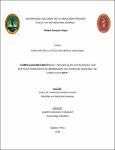Complicaciones maternas y neonatales en pacientes con ruptura prematura de membranas del hospital regional de Loreto 2016-2017
Abstract
Objetivo: Describir complicaciones maternas y neonatales en pacientes con ruptura prematura de membranas en el Hospital Regional de Loreto 2016-2017.
Material y Método: Investigación cuantitativo, transversal y retrospectivo. La población estuvo conformada por 116 gestantes con ruptura prematura de membranas. La muestra se obtuvo de acuerdo a los criterios de selección y fue 116.
Resultados: Se encontró que la edad promedio de las gestantes fue de 23.86 años, de los controles prenatales en nuestras gestantes mostró que 56.9% tenían entre uno y cinco controles prenatales y el 37.07% eran totalmente controladas con 6 o más controles. En el manejo del trabajo de parto y tiempo de latencia del trabajo de parto, mi estudio encontró que el 44% fueron prolongados (mayor a 24 horas) y el 56% fue dentro del límite. La conducta terapéutica del manejo del RPM diagnosticado en su 100% por historia clínica, fue como a continuación se presenta: el 67% presentó una conducta agresiva para el término del embarazo, el 17% intervencionista, y solo el 16% fue expectante. De las complicaciones neonatales el estudio arrojó que un 13% fue diagnosticado de sufrimiento fetal agudo. Además el 22% presentó bajo peso al nacer siendo el complemento eutrófico en aquellas gestantes diagnosticadas con RPM. En nuestros participantes, ninguno de los neonatos presentó síndrome de dificultad respiratoria, membrana hialina, neumonía neonatal ni prolapso de cordón y mortalidad neonatal, sin embargo, solo uno de ellos tuvo el diagnóstico de sepsis neonatal que representa el 1%. De las complicaciones maternas la más frecuente fue la corioamnionitis que represento un 11% en las participantes, pero sin embargo ninguna de ellas resultó en endometritis o infección puerperal, sepsis. Objective: To describe maternal and neonatal complications in patients with premature rupture of membranes in the Regional Hospital of Loreto 2016-2017.
Material and Method: Quantitative, transversal and retrospective research. The population consisted of 116 pregnant women with premature rupture of membranes. The sample was obtained according to the selection criteria and was 116.
Results: It was found that the average age of the pregnant women was 23.86 years, of the prenatal controls in our pregnant women showed that 56.9% had between one and five prenatal controls and 37.07% were fully controlled with 6 or more controls. In the management of labor and latency time of labor, my study found that 44% were prolonged (greater than 24 hours) and 56% were within the limit. The therapeutic behavior of the management of the RPM diagnosed in its 100% by clinical history, was as follows: 67% presented an aggressive behavior for the end of pregnancy, 17% interventionist, and only 16% was expectant. Of the neonatal complications, the study showed that 13% were diagnosed with acute fetal distress. In addition, 22% presented low birth weight being the eutrophic complement in those pregnant diagnosed with RPM. In our participants, none of the neonates had respiratory distress syndrome, hyaline membrane, neonatal pneumonia or cord prolapse and neonatal mortality, however, only one of them had the diagnosis of neonatal sepsis that represents 1%. Of the maternal complications, the most frequent was chorioamnionitis, which represented 11% in the participants, but none of them resulted in endometritis or puerperal infection, sepsis.
Collections
- Tesis [368]
The following license files are associated with this item:


